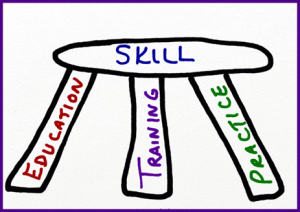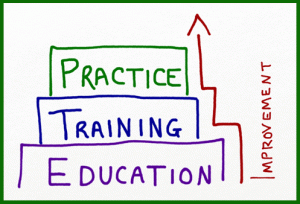Education, training, and practice all work together to increase your personal safety. As you build your skills within those three major learning spheres, you also develop a solid mindset. Leaving out one of these three major legs of learning is like trying to set your rear end on a three-legged stool with one leg missing. Yeah, you can do it… but you’re likely to dump yourself on the ground. Three-legged stools work best when all three legs are there to provide support.
 You’re reading this blog, so I reasonably believe you’re already on board with the idea of getting some education about how to use a handgun for self defense. But education, by itself, can’t teach you how to perform a physical skill — and shooting is, first and foremost, a physical skill. You wouldn’t expect to learn how to waterski by reading a book. Nor should you expect to learn how to shoot well, just from reading. At some point, you have to go hands on, with training and with practice. So let’s talk about those other two legs, training and practice.
You’re reading this blog, so I reasonably believe you’re already on board with the idea of getting some education about how to use a handgun for self defense. But education, by itself, can’t teach you how to perform a physical skill — and shooting is, first and foremost, a physical skill. You wouldn’t expect to learn how to waterski by reading a book. Nor should you expect to learn how to shoot well, just from reading. At some point, you have to go hands on, with training and with practice. So let’s talk about those other two legs, training and practice.
Training and practice go together — in that order!
Practice is necessary, but when you practice without training first, you will often practice the wrong things. You will also often fail to practice some of the right things.
Some people skip over the idea of learning from others. They don’t take a class. Instead, they head straight into practice, ignoring the idea of getting personal training. Life is tough for these people, though they often don’t realize it. They see that they “can” learn to shoot by themselves. Unfortunately, these people usually do not understand how much time and how many resources they are wasting by doing this. They don’t see how much more money they will have to spend on ammunition in the future, unlearning deeply ingrained bad habits, such as how they use the trigger. When they start down that road, they don’t usually foresee just how hard they will have to work to undo lazy or inefficient habits they build along the way — habits they have diligently built by going to the range to practice when they have not first learned what they should practice.
Other people invest a lot of money in training, but rarely practice. These people are also making it very tough on themselves. Like the practicers who don’t train, people who train but don’t practice rarely see how much they are giving up. They don’t realize that the entire purpose of the training class is to show you what you need to practice. They don’t know that, without ongoing practice, they are effectively throwing away the costs of the class (which can be substantial). That’s because, within the context of a one-, two-, or four-day class, there simply isn’t enough time to fully ingrain new, good habits. Good training teaches you what to practice on your own and why. It reaches its full value only when students follow up with regular, dedicated practice that centers on the efficient ways to do things.
So you need both training and practice. But people make excuses to avoid both those things. No time, no money…
Money is an issue for a lot of people. Yes, training can be expensive. But ignorance is far more expensive, and often tragic. I say this as a woman who raised five children on almost nothing, during years when we were so broke we would have had to save up to be called “poor.” We weren’t quite broke enough to eat boiled dishrag soup, but scraped icebox was indeed on the menu. My husband and I deliberately chose to rear our own homeschooled and home-grown children, and that means we lived entirely on his salary … which was always less than $35k a year, sometimes a lot less. We have been broke and even more broke than that, but we have never taken government assistance nor asked anyone else to help us feed our children.
 When I decided to arm myself against a dangerous world, I had to find ways to buy ammunition out of that too-tight grocery budget. A friend of ours bought me my first training class (and bless him for it!) At that time, I discovered that simply owning the firearm was really not enough if I wanted to be able to stay safe and keep my family safe. The gun, by itself, doesn’t do anything. It needs someone behind it who knows what she’s doing.
When I decided to arm myself against a dangerous world, I had to find ways to buy ammunition out of that too-tight grocery budget. A friend of ours bought me my first training class (and bless him for it!) At that time, I discovered that simply owning the firearm was really not enough if I wanted to be able to stay safe and keep my family safe. The gun, by itself, doesn’t do anything. It needs someone behind it who knows what she’s doing.
It would have been very easy to say, “Well, taking that first class was all I could do, and more than most ever do anyway,” and to quit learning right there. But that class really showed me that I needed to learn more if I wanted to be well-prepared to protect myself and my little boys.
So I worked my tail off to keep learning more: I scrounged brass, worked out three-cornered barter deals, worked weekend jobs while my husband was home, traded babysitting hours with friends so the kids would be taken care of while I was at school, borrowed books, shamelessly used every friend who knew more than I did. Eventually I’d learned enough that the three-cornered barter deals turned into straight barter deals: “We’ll let you take the next class if you’ll work on the line for this last class.” It took a very long time to reach that point and it only happened because I was bound and determined to make it happen.
Now when people hear that I believe training is an important part of owning a gun for self-defense, sometimes they get a little defensive themselves. They say stuff to me like, “Well, that just means you’re rich! You could just throw money away on classes like that! Not everyone can afford…” Or they tell me I must believe owning guns is for rich people, for those who can take the time and spend the money to study how to defend themselves. They tell me that regular people can’t afford it and that anyone who says people really need to learn defensive handgun skills within the context of a class is either an elitist or a snob.
That really hurts, because it’s not true. From firsthand experience, I know how hard it is to scrounge enough money to take a professional training class. I know what a challenge it is to find someone to watch your children for the weekend. I know the emotional roller coaster that goes with making the “selfish” decision to spend family resources on your own personal development — never mind that your “selfish” decision to be well-prepared to protect the people you love is actually the least selfish choice you could possibly make. These things I have learned through my own experience and I am no more immune to those pressures than any other woman in this world.
And I still say it’s important, even vital. Everything I know about using handguns in self-defense, everything I’ve learned about how to protect my family, everything I’ve studied and practiced … I worked for that. It did not drop down on top of me out of the clear blue sky, like “She’s just really talented.” Oh, no! For every skill I have learned, for every class I took, I sweated hours in the hot sun or shivered in the freezing rain on a weekend construction site. Or I humiliated myself grabbing other people’s garbage to recycle. Or I left my children with someone else’s mom so I could work a mind-numbing, boring seasonal job tagging Christmas trees. Learning how to defend myself and my family was a high priority for me and I acted like it.
Most of the people who complain that training is too expensive, and won’t take even a basic class because of how much it costs, actually have far more resources than I and my family ever did.
When I say to you that people need training, and the more training they get the safer and better off they are — I believe that, with all my heart. I have put my sweat and sometimes my tears into that belief. I believe so strongly that good training can save lives that I’ve poured the last ten years of my life into helping others get that training too.
If you have the means to get training — and nearly everyone in America does, one way or the other — but you don’t do it, you’re being very foolish and short sighted. Firearms don’t protect you by themselves. They aren’t magic. They don’t defend your family for you. They cannot be effectively used without skill, and skill only comes to those who work for it.
Bottom line: This is why I hold a profound degree of respect for my students, and for students of other schools who have worked to learn what they need to know. Their knowledge and skill doesn’t magically drop down on them from the sky. It doesn’t come to them without cost. Hats off in respect for the work these good citizens have done and continue to do in learning how to protect themselves and the people they love.




